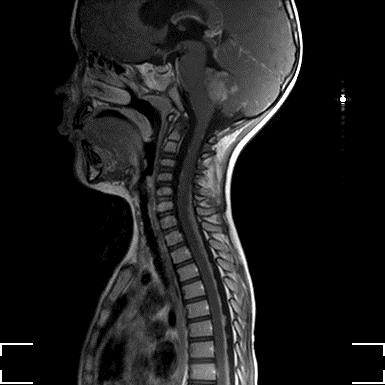
Medulloblastoma is the most common childhood brain cancer, and current treatments often have debilitating effects on developing children – a situation that highlights the need for molecularly targeted treatments with reduced toxicity. The present study analyzed hundreds of sequenced medulloblastoma (MB) samples, identifying numerous new targets that could give children with this disease new, less harmful therapeutic options.
The research was led by Dr. Michael Taylor (Toronto’s Hospital for Sick Children) and Dr. Peter Lichter (German Cancer Research Center, Heidelberg), and was recently published with first author Dr. Paul. A Northcott (Nature, July 2017).Targeted treatments for MB are limited despite a significant need for new therapies, a dilemma that spurred the team to undergo a deep dive into the full range of genetic lesions and molecular heterogeneity that contribute to the different MB subgroups.
Previous research from Dr. Taylor’s group showed there are four main molecular subgroups –Wingless (WNT), Sonic hedgehog (SHH), Group 3 and Group 4 – that have distinct epigenetic and transcriptional signatures. In the present study, the team examined 491 sequenced, previously untreated medulloblastoma samples and the molecular heterogeneity among 1,256 epigenetically analyzed cases.
The results were impressive: on an individual gene level, new candidate drivers were discovered in each of the different subgroups, and were assigned to most patients belonging to Group 3 and Group 4, greatly enhancing previous knowledge. For example, all 36 WNT MBs sequenced in this study were confidently explained by mutations in at least one or more driver genes, and the team assigned at least one driver gene to more than 95 per cent of patients with SHH MB. Further, new molecular subtypes were differentially enriched for specific driver events, including hotspot in-frame insertions that target KBTBD4 and ‘enhancer hijacking’ events that activate PRDM6.
Applying integrative genomics to a large study of patient samples derived from medulloblastoma revealed a series of cancer genes and biologically relevant subtype diversity, some of which could be targeted with new, personalized therapeutics. The present study’s findings – combined with future research – will likely help to advance treatments and to improve prognosis for children and families affected by this devastating brain cancer.
Study: The whole-genome landscape of medulloblastoma subtypes
Authors: Paul A. Northcott Ivo Buchhalter, A. Sorana Morrissy, Volker Hovestadt, Joachim Weischenfeldt, Tobias Ehrenberger, Susanne Gröbner, Maia Segura-Wang, Thomas Zichner, Vasilisa A. Rudneva, Hans-Jörg Warnatz, Nikos Sidiropoulos, Aaron H. Phillips, Steven Schumacher, Kortine Kleinheinz, Sebastian M. Waszak, Serap Erkek, David T. W. Jones, Barbara C. Worst, Marcel Kool, Marc Zapatka, Natalie Jäger, Lukas Chavez, Barbara Hutter, Matthias Bieg, Nagarajan Paramasivam, Michael Heinold, Zuguang Gu, Naveed Ishaque, Christina Jäger-Schmidt, Charles D. Imbusch, Alke Jugold, Daniel Hübschmann, Thomas Risch, Vyacheslav Amstislavskiy, Francisco German Rodriguez Gonzalez, Ursula D. Weber, Stephan Wolf, Giles W. Robinson, Xin Zhou, Gang Wu, David Finkelstein, Yanling Liu, Florence M. G. Cavalli, Betty Luu, Vijay Ramaswamy, Xiaochong Wu, Jan Koster, Marina Ryzhova, Yoon-Jae Cho, Scott L. Pomeroy, Christel Herold-Mende, Martin Schuhmann, Martin Ebinger, Linda M. Liau, Jaume Mora, Roger E. McLendon, Nada Jabado, Toshihiro Kumabe, Eric Chuah, Yussanne Ma, Richard A. Moore, Andrew J. Mungall, Karen L. Mungall, Nina Thiessen, Kane Tse, Tina Wong, Steven J. M. Jones, Olaf Witt, Till Milde, Andreas Von Deimling, David Capper, Andrey Korshunov, Marie-Laure Yaspo, Richard Kriwacki, Amar Gajjar, Jinghui Zhang, Rameen Beroukhim, Ernest Fraenke, Jan O. Korbel, Benedikt Brors, Matthias Schlesner, Roland Eils, Marco A. Marra, Stefan M. Pfister, Michael D. Taylor & Peter Lichter.
Funding: The MAGIC project is partially financially supported by the Terry Fox Research Institute. M.D.T. is supported by the Garron Family Chair in Childhood Cancer Research, and grants from the Cure Search Foundation, the National Institutes of Health (R01CA148699 and R01CA159859), the Pediatric Brain Tumor Foundation, the Terry Fox Research Institute, and b.r.a.i.n.child. This work was also supported by a Program Project Grant from the Terry Fox Research Institute.
TFRI LINKS, Summer 2017